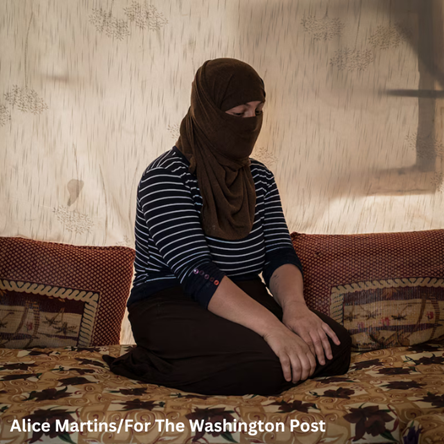Welcome Back to Dissent Dispatch
This week’s Unbelief Brief examines the rescue of a Yazidi woman trafficked to Gaza, Bibles in Oklahoma public schools and atheists outnumbering theists in the UK.
EXMNA Insights looks at the uncomfortable truth of Islamic sex slavery.
The Unbelief Brief

A Yazidi woman who was kidnapped more than 10 years ago by ISIS has been freed in a “complex operation coordinated between Israel, the United States, and other international actors,” according to the Israeli military and confirmed by the US and Iraq. Enslaved at the age of 11, Fawzia Amin Sido, was trafficked to Gaza where she spent a decade in captivity. It is an intersection of two of the Islamic State’s most heinous acts: committing genocide against the Yazidis in Iraq and also women who they treat with such cruelty as to be less than human in the militant zealots’ minds. More on the topic in EXMNA Insights below.
Back in the United States, Oklahoma State Superintendent Ryan Walters has made clear his intent for the education system in the state: “Every teacher, every classroom in the state, will have a Bible in the classroom and will be teaching from the Bible.” The flouting of the First Amendment and the principle of church-state separation enshrined therein is so flagrant and shameless as to almost be comical. The bow that wraps this all together is the recent revelation that the state put out a bid order for 55,000 classroom Bibles, the description for which mirrors exactly the Bibles that former president Trump has endorsed, which are priced at upwards of $60USD. There is some consolation in the likelihood that no honest court will allow this to go through, but this is nevertheless the kind of theocratic mindset that still reigns among some very high-ranking Republican elected officials in the US.
Finally: a new and extensive study has found that, for the first time in history, atheists outnumber theists in the UK. The findings are from Explaining Atheism, a years-long project “led by Queen’s University Belfast” in cooperation with several other universities in the UK and Australia. Apart from illuminating this rather earth-shattering development in the UK, the project aims to elucidate the causes and manifestations of the increasing prevalence of atheism around the world. Checking it out is well worth your time: here.
EXMNA Insights

Islamic scriptures present a troubling legacy regarding slavery, particularly sexual slavery. One of the most controversial concepts is "what the right hand possesses," referring to captives of war, including women, taken as slaves. The Qur'an, in multiple verses, sanctions this practice. For instance, Qur’an 33:50 references: “... those whom your right hands possess,” permitting sexual relations with female captives. Similarly, Surah Al-Mu’minun (23:5-6) and Surah Al-Maarij (70:29-30) both repeat exemptions regarding moral norms of chastity for enslaved women.
This practice is further reinforced in the Hadith. In Sahih Muslim (3371), Muhammad gave his approval for his companions to have sexual relations with female captives during military campaigns (Sahih Muslim 8:3432, Qur’an 4:24). Such accounts elucidate moral and ethical concerns about how Islam viewed the humanity of enslaved women, especially given that female slaves do not have the right to deny sexual intercourse with their captors.
Muhammad himself owned slaves, including Maria al-Qibtiyya and Rayhana bint Zayd. Maria, a coptic Egyptian slave gifted to him, was granted freedom only after bearing Muhammad’s son Ibrahim, who later died in infancy. Rayhana was captured during the campaign against the Banu Qurayza tribe and later became one of his concubines.
In more recent times, the continuation of this legacy is evidenced by reports of wealthy Muslims, including monarchs, keeping slave women. For example, the Saudi royal family and other Gulf monarchs were known to have kept concubines and domestic slaves well into the mid-20th century. However, these are not the only modern examples of religiously sanctioned slavery. Slavery remains a disturbing practice even today, long after it was abolished in other parts of the world. In 1981, Mauritania became the last nation in the world to outlaw slavery, yet the Haratine ethnic minority, who historically made up the majority population of slaves in the country, remain as bonded laborers, a ‘proximate form of slavery’. Even more recently, ISIS and Boko Haram engaged in the widespread kidnapping of women and girls for the purposes of sexual slavery.
Muslim apologists often argue that Islamic slavery was more "humane" than the Western transatlantic slave trade, pointing to rules about treating slaves with dignity and allowing them rights such as manumission. However, in addition to ignoring the fundamental violation of human dignity inherent in slavery itself, it whitewashes the horrors of the Islamic slave trade. While it is true that unlike the transatlantic slave trade, slavery in the Muslim world was not explicitly racist, its primary victims were still sub-saharan Africans. Whether in the Islamic world or the West, slavery is an abhorrent and indefensible practice; any system, religious or cultural, that supports or condones it simply illustrates its own moral desolation.
Until next week,
The Team at Ex-Muslims of North America
P.S. We’d love to hear from you! Share your feedback at [email protected].


